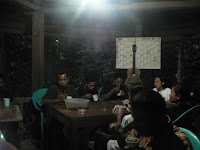 Waktre came back shortly after. Said something I didn’t understand, and invited me to celebrate Idul Fitri with him next morning, we will leave at 8.
Waktre came back shortly after. Said something I didn’t understand, and invited me to celebrate Idul Fitri with him next morning, we will leave at 8.So this morning I wake up, I cannot sleep over 6 a.m. (a bloody curse!), I read (junk! I need books, damn!). He wakes up, goes grab an iron board and iron, and carefully irons a shirt (which is very romantic, except that then he wears another one..), takes a shower. And off we go, on his yellow motorbike. But he is not Muslim… he is Hindu, he is from Bali..
In fact, we arrive at his girlfriend’s home, in a small kampung (neighborhood in this case) on top of one of the hills surrounding TK (a bit like Roma). I am wearing jeans, Nic’s “Gone Dutch” black t-shirt, and sandals, again feel very inappropriate, when the streets keep narrowing and more and more people are around I feel I shouldn’t be there..
We enter the crowded house and I am welcomed warmly, I shake hands, I am taken to her father, a dignified elegant man sitting and receiving the greetings of everybody. I am offered a seat, of course I am told to eat, special sweet foods prepared for the occasion. And more and more people keep coming and greeting. Handshakes are complicated, as I wrote before. Here, the hand can have many degrees of firmness, how much you clasp of it also varies. You can use both your hands, or use the left to support right. You can then bring one or both up to your heart, two sides of chest, forehead. You can bow a little. Kids take your hand and bring it slowly to their forehead, bowing. An important component of this celebration is asking forgiveness “from the bottom of your heart” to your family and friends, for sins and wrongs. So, you kneel to elders, bring their hand to your forehead, murmur your repentance, and receive their blessing, more or less articulated. It is a touching moment (for example, when Waktre received that of his girlfriend’s father).
So, after a little while that I was sitting (and standing up at each new arrival), Waktre’s girlfriend (I know, I am bad, I don’t know her name! I didn’t dare ask again.. so much I have to learn, still..) says something like “Shall we?”. Meaning that it’s our turn to go around! And we do it, and I am sooo happy because it is great! We visit all of the houses of the neighborhood, take shoes on and off about 40 times. We enter, we greet, we smile, my presence is explained, I am welcomed everywhere, often we cannot refuse to sit down and accept snacks and the special anti-puasa drink. I think the first five homes I was just hovering in a cloud of happiness, without thinking much, probably with a stupid smile constantly on my face. Then, while still enjoying the experience deeply, I started perceiving more subtle patterns, different behaviors: in some cases the greeting and relationships are formally perfect, but you see a lack of warmth, in other cases it is really from the heart, for some it is more like a party, for others the religious component is more prevalent. In some houses we stay longer. I smile when I think of Robin Fox, conversations on kinship, there seem to be so many layers of “brotherhood”, and of course I don’t dare to ask details, draw charts (would love to! When I have more confidence and mastery of the language..).. and to think that this system is probably fairly simple..
Small babies are afraid of me, fathers joke with them, bringing them close, they cry and hit them mildly. Older kids receive small amounts of money in some cases. Two great episodes:
- A two-year-old girl, holding (and frequently letting go) a banknote. She was then presented with that banknote (picked up for the n-th time) and a cassava chip. And of course she chose the chip. And then they switched the banknote for a jambu, a bright red fruit. And she picked that! Excellent.
- A 6-year-old girl, flowery dress, long messy curly hair, huge pretty eyes lost somewhere, ignoring her two younger brothers gobbling up food. When a woman comes and gives a banknote to each of the brother, and then offers one to her, she brings her eyes on her and lightly, absently, says “No, thanks, I already have one”. Most people smiled or laughed, my heart was exploding, stadium chants and screams came to my lips..
After a couple of hours we head back home, where I am offered more snacks. And I greet new people. Then, we are called to lunch! Rice portions cooked in small wicker baskets, rendang (my favorite meat), a vegetable curry-like soup, Javanese traditional chicken. Then back to the living room. More people coming. Passion fruit juice. Fermented rice, delicious: white and red glutinous rice, left alone with yeast for two nights, throws out water, and becomes a sour/sweet (quite sweet) dessert. If you keep fermenting the water, it becomes arak, a liquor (at that, I didn’t know how to react.. Waktre can drink alcohol, so I could say “Hmm, interesting, would love to try”, but the others are not, so I wondered with a smile if I should say “Hmm, what a shame”. In doubt, I chose a completely neutral face and “Oh”..)


